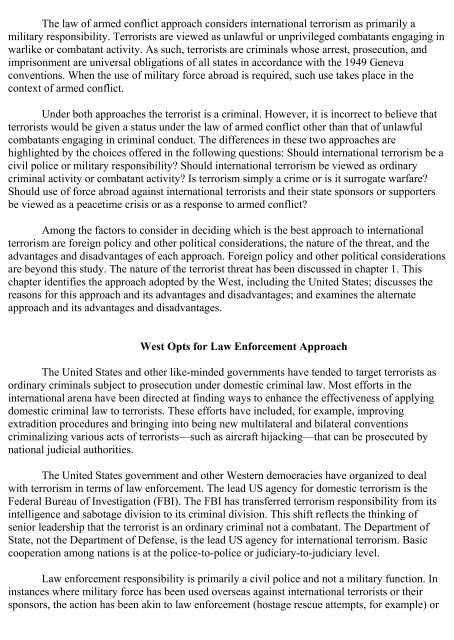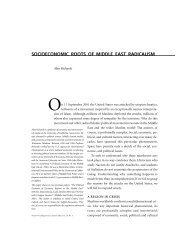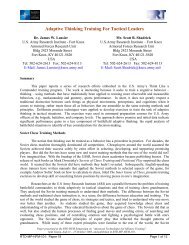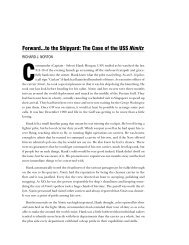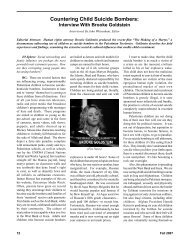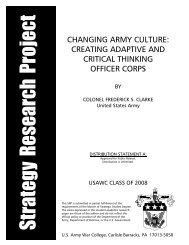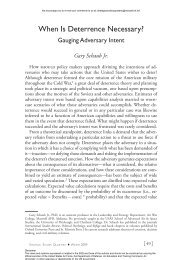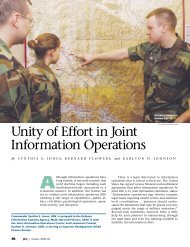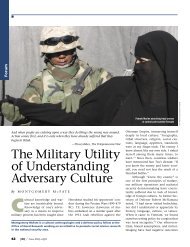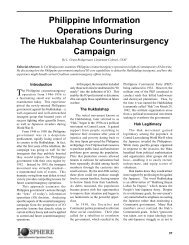Legitimate use of military force against state-sponsored - Air University
Legitimate use of military force against state-sponsored - Air University
Legitimate use of military force against state-sponsored - Air University
Create successful ePaper yourself
Turn your PDF publications into a flip-book with our unique Google optimized e-Paper software.
The law <strong>of</strong> armed conflict approach considers international terrorism as primarily a<br />
<strong>military</strong> responsibility. Terrorists are viewed as unlawful or unprivileged combatants engaging in<br />
warlike or combatant activity. As such, terrorists are criminals whose arrest, prosecution, and<br />
imprisonment are universal obligations <strong>of</strong> all <strong>state</strong>s in accordance with the 1949 Geneva<br />
conventions. When the <strong>use</strong> <strong>of</strong> <strong>military</strong> <strong>force</strong> abroad is required, such <strong>use</strong> takes place in the<br />
context <strong>of</strong> armed conflict.<br />
Under both approaches the terrorist is a criminal. However, it is incorrect to believe that<br />
terrorists would be given a status under the law <strong>of</strong> armed conflict other than that <strong>of</strong> unlawful<br />
combatants engaging in criminal conduct. The differences in these two approaches are<br />
highlighted by the choices <strong>of</strong>fered in the following questions: Should international terrorism be a<br />
civil police or <strong>military</strong> responsibility? Should international terrorism be viewed as ordinary<br />
criminal activity or combatant activity? Is terrorism simply a crime or is it surrogate warfare?<br />
Should <strong>use</strong> <strong>of</strong> <strong>force</strong> abroad <strong>against</strong> international terrorists and their <strong>state</strong> sponsors or supporters<br />
be viewed as a peacetime crisis or as a response to armed conflict?<br />
Among the factors to consider in deciding which is the best approach to international<br />
terrorism are foreign policy and other political considerations, the nature <strong>of</strong> the threat, and the<br />
advantages and disadvantages <strong>of</strong> each approach. Foreign policy and other political considerations<br />
are beyond this study. The nature <strong>of</strong> the terrorist threat has been discussed in chapter 1. This<br />
chapter identifies the approach adopted by the West, including the United States; discusses the<br />
reasons for this approach and its advantages and disadvantages; and examines the alternate<br />
approach and its advantages and disadvantages.<br />
West Opts for Law En<strong>force</strong>ment Approach<br />
The United States and other like-minded governments have tended to target terrorists as<br />
ordinary criminals subject to prosecution under domestic criminal law. Most efforts in the<br />
international arena have been directed at finding ways to enhance the effectiveness <strong>of</strong> applying<br />
domestic criminal law to terrorists. These efforts have included, for example, improving<br />
extradition procedures and bringing into being new multilateral and bilateral conventions<br />
criminalizing various acts <strong>of</strong> terrorists—such as aircraft hijacking—that can be prosecuted by<br />
national judicial authorities.<br />
The United States government and other Western democracies have organized to deal<br />
with terrorism in terms <strong>of</strong> law en<strong>force</strong>ment. The lead US agency for domestic terrorism is the<br />
Federal Bureau <strong>of</strong> Investigation (FBI). The FBI has transferred terrorism responsibility from its<br />
intelligence and sabotage division to its criminal division. This shift reflects the thinking <strong>of</strong><br />
senior leadership that the terrorist is an ordinary criminal not a combatant. The Department <strong>of</strong><br />
State, not the Department <strong>of</strong> Defense, is the lead US agency for international terrorism. Basic<br />
cooperation among nations is at the police-to-police or judiciary-to-judiciary level.<br />
Law en<strong>force</strong>ment responsibility is primarily a civil police and not a <strong>military</strong> function. In<br />
instances where <strong>military</strong> <strong>force</strong> has been <strong>use</strong>d overseas <strong>against</strong> international terrorists or their<br />
sponsors, the action has been akin to law en<strong>force</strong>ment (hostage rescue attempts, for example) or


